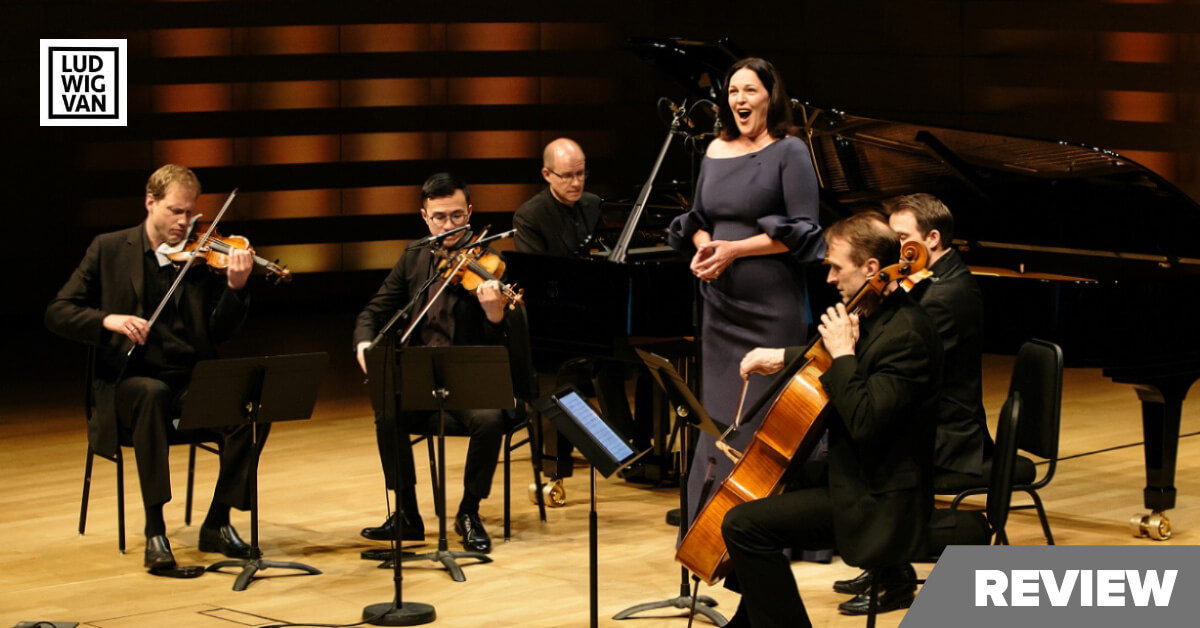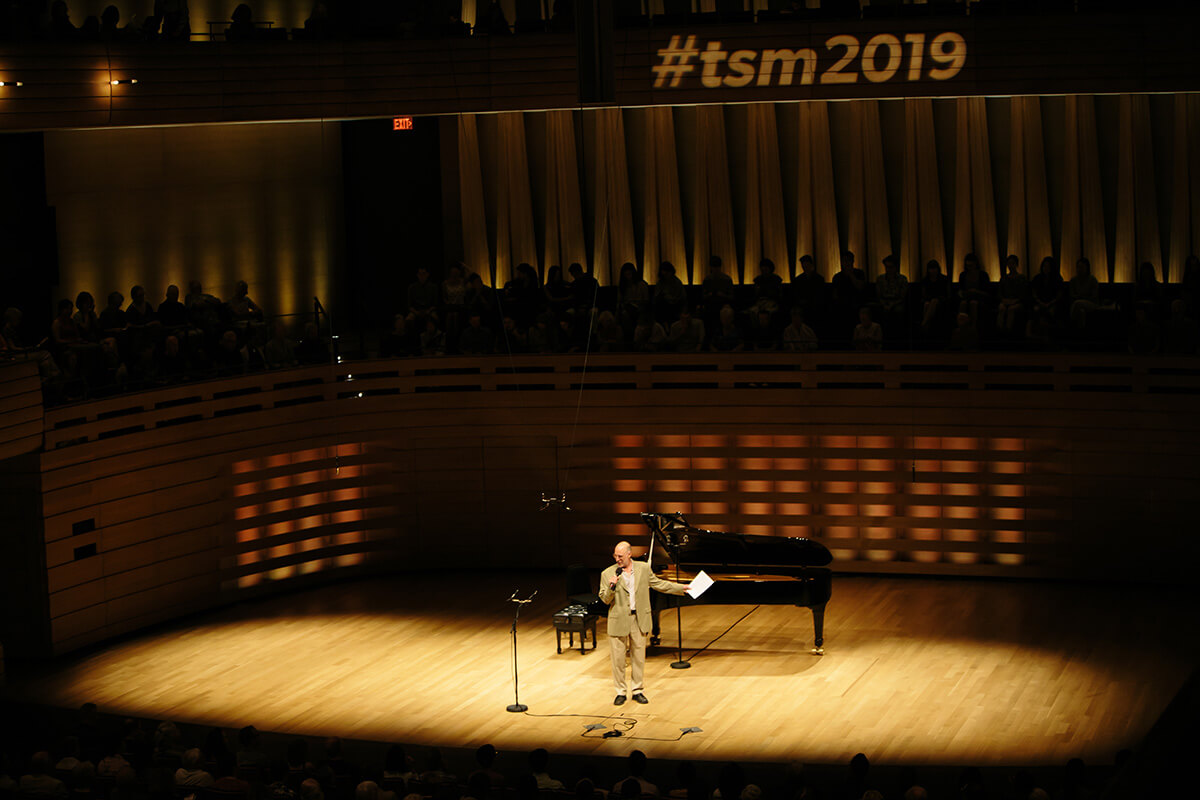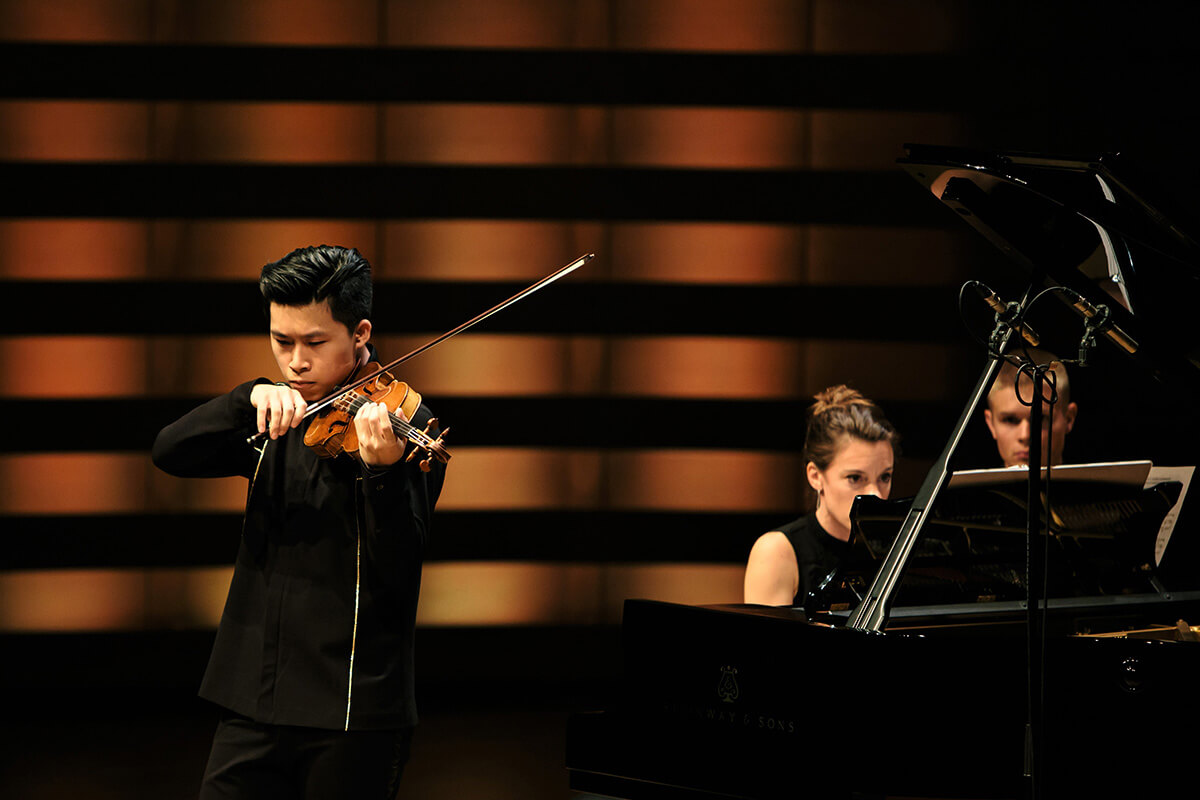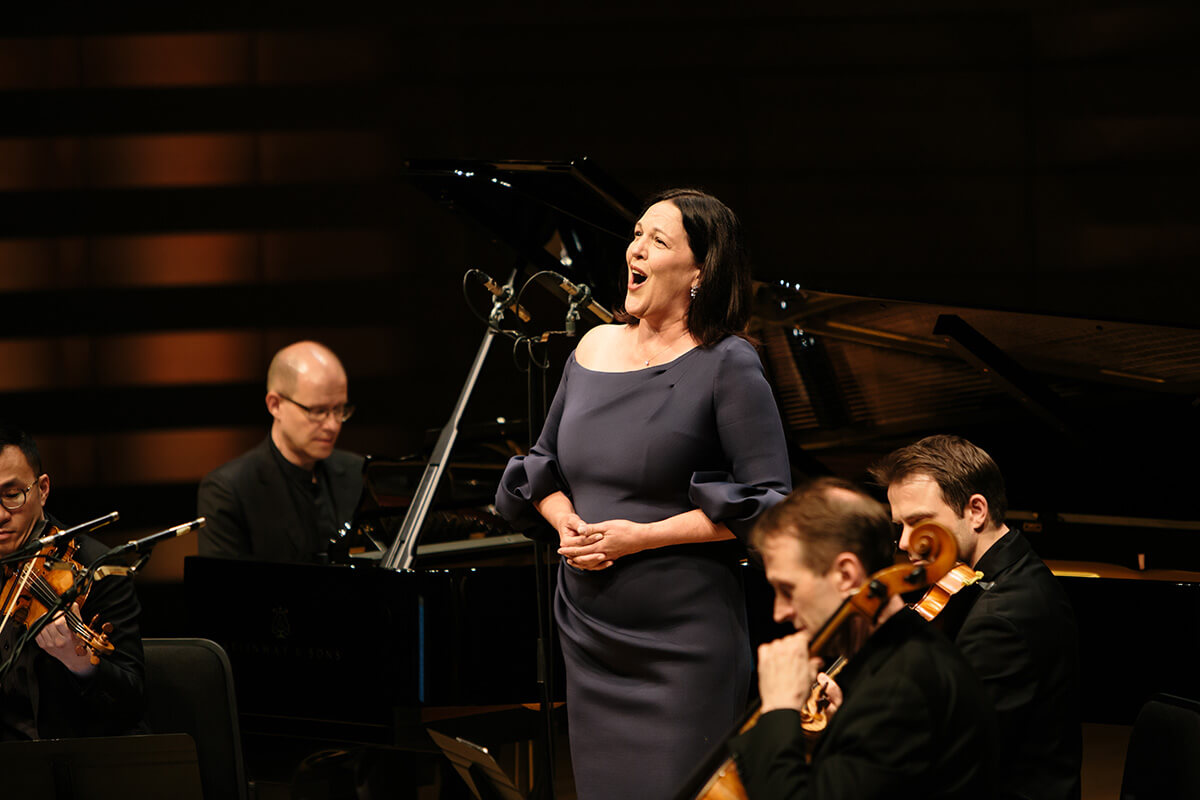
Mozart/Ravel/Sarasate/Kreisler/Brahms/Chopin/Strauss. Adrianne Pieczonka, Jon Kimura Parker, Kerson Leong, Rachael Kerr, Steven Philcox, New Orford String Quartet. Tom Allen, host. July 11, 7:30 p.m. Koerner Hall.
For three weeks straddling July and August each summer, Torontonians get a chance to hear some wonderful classical music put on by Toronto Summer Music, with a focus on chamber works and the art of the song. This year’s theme is Beyond Borders, celebrating the crosscurrents that have inspired many a musical creation, in what we call “western classical music.” Given the current political climate that seems to stress the building of borders and walls, the TSM theme is timely indeed, underscoring the universality of music.
TSM opened last evening to a sold-out Koerner Hall. Judging by the enthusiastic ovations at the end, it was a night to remember. The stellar lineup included Jon Kimura Parker playing Mozart and Chopin, the young violinist Kerson Leong joined by collaborative pianist Rachael Kerr in super-virtuoso pieces by Sarasate and Kreisler, and Canadian soprano Adrianne Pieczonka singing Richard Strauss’s Vier letzte Lieder, in a new chamber arrangement by John Greer, with the New Orford Quartet and pianist Steven Philcox.
The allure of this program was such that I decided to forgo attending the Munich Opera Festival — for the first time in eleven years — to stay home. It wasn’t easy giving up the opportunity to see the great Jonas Kaufmann in Otello, but I am happy to say it was worth it. The TSM opening night was anchored by host Tom Allen, who gave interesting (and often funny) background information on the program, particularly on how non-European music and cultures have offered inspirations in the creation of western classical music.

Jon Kimura Parker kicked off the proceedings with Mozart’s Piano Sonata in A Major, K. 331, with its familiar “Rondo alla turca.” Parker played with his customary elegant phrasing, exemplary nuance and great attention to dynamic variations in the Andante and Menuetto, while the Rondo had all the liveliness one would want. It’s funny that this very familiar tune is so much part of the Mozart piano fans’ DNA that I, for one, never think of it as “exotic.” That goes to show that music (and musical inspiration) is universal. In the second half, Parker contributed Chopin’s Ballade No. 4 — magnificent playing by him, especially the technically stupendous ending, which earned him a huge ovation.
Then it was Adrianne Pieczonka’s turn, a rendition of Ravel’s Cinq melodies populaires grecques. Popular indeed — I think I must have heard it in recitals a half-dozen times the last couple of seasons. It’s written very gratefully for the voice, sitting in a comfortable tessitura. The gleam and the youthfulness of Pieczonka’s tone was extraordinary, especially when one considers that she has already enjoyed a career of over thirty years. And I must say the Koerner Hall’s famous acoustics is ideal for her. These Ravel songs are happy folk tunes, innocent and quite uncomplicated, a refreshing departure from the doom and gloom we often encounter in a Liederabend! Steven Philcox was the ever sympathetic and attentive pianist.

The first half concluded with a barnburner, Sarasate’s Zigeunerweisen, played by that wunderkind of Canadian violinist Kerson Leong. At 22, he’s no longer “promising” but has “arrived.” He also plays on a Guarneri del Gesu, not too shabby! One can’t help but be impressed by his jaw-dropping technique. That said, he’s no mere technician. Everything is executed with uncommon musicality and expressivity. I grew up on recordings of Heifetz, Perlman and all the greats, and one can get a bit jaded with this piece, but Leong was so superb that I found myself smiling the whole 9 minutes.
He then opened the second half with four pieces composed/arranged by Fritz Kreisler. The dazzling virtuosity of Leong’s playing took my breath away. Yes, I admit I’m easily impressed by prodigious technique, but in all honesty, I sense a true musical heart underneath all that razzle-dazzle. The very appreciative audience broke into vociferous applause, wholly deserved. And I mustn’t forget to mention the exceptional collaborative pianism of Rachael Kerr. I am familiar with her work with the COC Ensemble Studio. Here she was in top form – talk about being on the same page! Her perfect, quicksilver timing was terrific.
The last item was, in my mind the centrepiece of the evening, Richard Strauss’s Vier letzte Lieder. Composed near the end of his life, it is a testament to Strauss as the supreme melodist and composer. A very exacting work, it’s also incredibly rewarding for the soloist. It’s Strauss’s gift to the soprano voice – never mind that Jonas Kaufmann, a tenor with a great voice but also a great ego, has chosen to tackle this piece. The text, by Hesse and Eichendorff, is autumnal and evocative, and Strauss certainly matched it perfectly in the music.
A truly great performance never fails to move the listener. I have heard many great ones, both live and on recordings — Schwarzkopf, Janowitz, Isokoski, Popp, and when I feel like hearing a dramatic voice, I turn to Jessye Norman’s recording. It’s a work that speaks directly to the soul. The most unforgettable was a performance given by Lucia Popp, a few months before she died of brain cancer in 1993. She was already quite ill — I cannot imagine sitting in that audience, trying to hold back the tears.

Given it’s such an excellent showcase for the high female voice, most full lyric sopranos and a few dramatics have tackled it. Pieczonka has just the right timbre and tonal weight for this cycle, and she recorded it nearly twenty years ago for Nightingale Classics, the label of Edita Gruberova and her conductor husband, Friedrich Haider. Before this concert, I contacted Pieczonka to get her thoughts on singing this cycle. She gave me the following comments:
“I have loved this piece since I first heard it sung by Kiri Te Kanawa and Jessye Norman (both quite different interpretations) decades ago. It’s the epitome of the glorious way Richard Strauss wrote for the soprano voice – long soaring lyric lines of spun gold. The texts are also very moving and, the older I get, the more meaningful they become, especially the final song Im Abendrot. I first sang it in 1993 at the Vienna State Opera. There was a modern ballet set to the cycle, and I was the soloist — I stood at the side of the stage while the dancers performed. I have since sung in all over Europe and in Tokyo. I’ve also sung in Toronto, with the TSO and Gianandrea Noseda.”
Given its weighty subject matter, Vier letzte Lieder is not a piece for the young. To give a truly meaningful performance, it takes the passage of time, a certain wisdom that only comes with age and life experience. With her 25+ years of singing this cycle, Pieczonka is an ideal interpreter, and it showed. In this performance, her approach was quiet, serene, understated, reflective, nuanced, rather internalized in emotions and suitably non-theatrical and non-operatic. Her tone took on a lovely gleam throughout, and she has the long breath line to do it justice.
Frühling, the first song, is a bit of a challenge for many sopranos, given the vocal writing, pushing at both extremes of the range. Pieczonka coped well, and once past, she went on to sing the other three songs with luminous tone, and an enviable balance of opulence and purity. I was particularly impressed by the poised singing of Beim Schlafengehen, the pinnacle of the cycle. Jonathan Crow played the violin solo superbly, then Pieczonka’s voice came in, out of thin air. It was the highlight of the evening. The extended orchestral coda that ends Im Abendrot, Pieczonka used her face to express the text eloquently, sadness from impending death, leading to eventual acceptance, serenity, and finally transcendence. A most touching moment.
I am leaving for last my comments on John Greer’s new arrangement for string quartet and piano. I must admit that my personal preference is VLL with orchestra. That said, this chamber version has some inherent merits. The soloist doesn’t have to battle the Strauss orchestra to be heard! The arrangement for Beim Schlafengehen was particularly fine — I love the transition from cello to viola to the violin, beautifully rendered by Greer.
The one area that I feel an orchestra is missed is the fff opening of the fourth song, Im Abendrot. Here, I really, really crave the sonorities that only a big orchestra can provide, even though Steven Philcox did his best on the piano to give a simulation of the orchestral sounds as much as possible. I also have to say I missed the woodwinds, and the horns. Despite that, my congratulations to John Greer for his valiant attempt, and I’m sure it will be heard again and again in the future.
There you have it, the TSM 2019 opening night, divine music superbly performed. Toronto music lovers are so lucky to have this festival every summer. With it going on to August 3 in a plethora of marvelous concerts, there will be many more highlights. It’s not to be missed.
Read more about Toronto Summer Music here.
LUDWIG VAN TORONTO
Want more updates on classical music and opera news and reviews? Follow us on Facebook, Instagram, or Twitter for all the latest.



